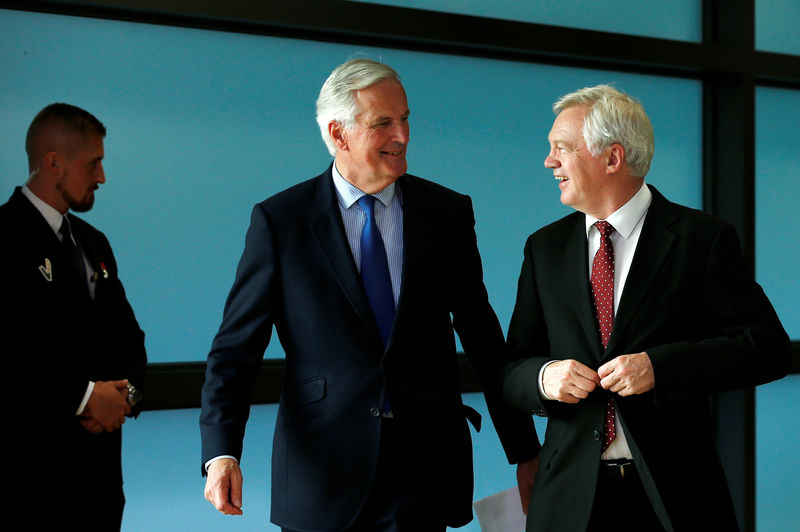Gold prices set for weekly gains on dovish Fed outlook; silver near record high
By Alastair Macdonald and Jan Strupczewski
BRUSSELS (Reuters) - British and EU negotiators talked up hopes for progress on Brexit as a new round of talks began in Brussels on Monday, three days after Prime Minister Theresa May tried to revive the process and improve the mood.
But neither side disguised continued frustrations: the European Union's Michel Barnier dismissed talk of Britain diverging from EU rules during any post-Brexit transition 18 months from now; Brexit minister David Davis urged him to stop stalling talks on future trade relations if he wants London to settle its accounts.
"The UK will honour commitments we have made during the period of our membership," Davis told reporters as he met Barnier. "But it is obvious that reaching a conclusion on this issue can only be done in the context of and in accordance with a new deep and special partnership with the European Union.
"We are laying down concrete proposals and there are no excuses for standing in the way of progress," he said, echoing May's remark in Florence on Friday that other states would not lose out financially in the current EU budget cycle to 2020.
Barnier said he wants to know this week what firm proposal Britain is making on settling its bills, one of the three main issues on which he is seeking "significant progress" before he will recommend that EU leaders launch talks on future relations.
Barnier emphasised that a future deal and a transition to it were not foregone conclusions. And he rejected suggestions that some EU rules might no longer apply if Britain stays in the single market for a couple of years after Brexit.
"Without exception," he said, Britain would remain subject to EU budgets, judges and so on -- a bitter pill for many Brexit supporters.
BUSY WEEK
He and Davis, meeting for the fourth round of talks in three months, both portrayed this week as an important moment; as it happens, the round is likely to wind up on Thursday just hours before May meets her fellow leaders at a summit in Estonia.
The Estonian minister who chaired a preparatory meeting on Monday for that summit said during a news conference with Barnier that the 27 were entirely united and insisted on the negotiations going through Barnier.
However, London hopes that progress in the talks can persuade leaders when they next meet in mid-October to give a green light to talks on future trade.
Sunday's German election has raised questions on whether the weakening of Chancellor Angela Merkel, Europe's power broker, may affect the EU's calculations on Brexit. But EU officials saw no indication Berlin would stray from Merkel's call for close ties with Britain but rejection of special favours to London.
In a bid to unblock the divorce talks, along with her words on settling budget commitments, May also offered a concession to EU concerns that the rights of their 3 million citizens living in Britain would be protected after Brexit. Davis said those rights, set out in the UK-EU withdrawal treaty, would be fully incorporated into British law -- though the EU position remains that expatriates should be entitled to appeal to the EU court.
The third key issue to be settled before the EU will agree to trade talks is on handling the sensitive border on the island of Ireland. Davis and Barnier renewed pledges to find solutions, though little detail has emerged on where those may lie and both sides acknowledge that much will depend on future trade terms.
